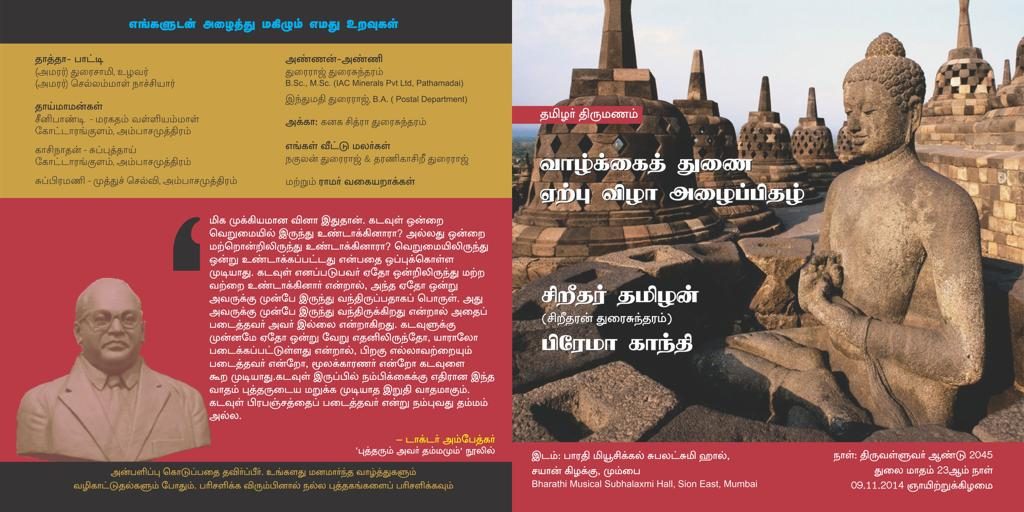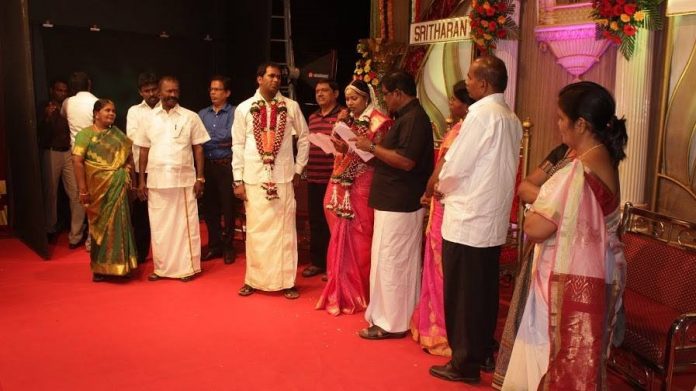Shridhar, 34, came to Mumbai in 2007 after he completed his engineering in Tamilnadu. He started staying in Dharavi, where many of the Tamil migrants stay, and being new to the city Shridhar got in touch with other youngsters from Tamil Nadu in Dharavi. It was a time when the Tamil Eelam movement was at its peak.
This was also the time when he came in contact with people who were involved in the Ambedkarite and Periyar movement in Mumbai. Sridhar says that until he came in contact with them, he was a god-fearing person. He adds, “There was so much going on, so many people were being killed. I questioned my own belief system. I read Buddha, Quran also the Bible looking for answers. In school no one taught us about Ambedkar, no one taught us about Periyar”. He went back and studied both works of Ambedkar and Periyar. He worked in the Periyarist and Ambedkarite Movement and also started his own rationalist initiative called Awareness.
Sridhar adds, “ I had almost 12 cases against me because of the protests within a span of four years from 2009 to 2012. People said look you an engineer you have a good job, but I wanted to do something good for the society”.
It is at this point where he decided that he needs to change his life, he learnt about the Self Respect Marriages and he wanted to implement that in his life. At the same time his family wanted him to get married, he had only one condition that it should be an intercaste marriage. But this wasn’t as easy as he taught. He adds, “Caste is like a pyramid, I saw that caste is everywhere, there is caste within caste itself, even within the Schedule Castes”.
Miles away in Tamil Nadu, Mohan (30) who is a artist and a Parai Trainer based in Tamil Nadu is planning to marry in next six months. He says that the works of Periyar and Ambedkar influenced him a lot in making this decision, also a chance visiting a friend respect marriage left a lasting impression on him.
Mohan whose partner is an artist, have mutually decided to have a Self Respect Marriage. Mohan says, “ Ours will be an inter-caste and inter-religion marriage. Self-Respect marriage is about equality…I want to give equal respect to my partner”.
He further adds that he is planning to call people from the movement to the marriage so it can make people aware of this.
Contested ideas of self-respect
Both Maharashtra and Tamil Nadu have seen a long tradition of the non-Brahmin movement. This radical anti-caste movement or the non-Brahmin movement was started by E Ramasamy Periyar in 1925. During 1925 in the midst of the nationalist movement, Periyar put forth the discourse of Self Respect. He proposed that every non-Brahmin caste should have equal human rights. This formulation of the idea of self-respect was different than what was propagated by Gandhi and Nehru. The Gandhian idea of self-respect came from more spiritualistic tenets of Hinduism specifically the varna system, where he said that the one should take dignity in labour and all occupations are equal. In contradiction, Nehru’s idea of Self Respect came from more of nationalistic discourse and taking pride in being a nationalist. Periyar contested both of these ideas, saying that self-respect should start with the individual himself, and that there and said that basic Self Respect will only come through over-throwing Brahminical Hegemony and bring in rationality amongst the citizens. Periyar spoke in the context of caste-based society and said that national freedom is of no use if there is no individual self-respect. To break the hegemony of the Brahmins, Periyar conceptualised Self Respect Marriages. One of the earlier self-respect marriage took place between Shanmugam and Manjula who was a widow in Araku near Madurai in her early 1920’s. But it was only in 1967 when DMK, which came from the Periyarite tradition under the leadership of Annadurai came to power, that Tamil Nadu became the first and only state to legalize Hindu marriages conducted without a Brahmin priest.
Hence a self-respect marriage saw marriage as a contract in a more constitutional non-sacred non-religious way. It encouraged inter-caste marriages and widow remarriage. An amendment was brought under section 7A of Hindu Marriage Act which validated self-respect marriages.
Basically, legalizing Self Respect Marriages threw out the regressive practices built on Brahmin Hegemony, firstly that being that it can take place without a Brahmin priest
The Provisions of section 7 A Amendments are 1)Section 7-A of the Act applies to any marriage between two Hindus solemnized in the presence of relatives, friends and other persons. 2)The main thrust of this provision is that the presence of a priest is not necessary for the performance of a valid marriage.3) Parties can enter into a marriage in the presence of relatives or friends or other persons and each party to the marriage should declare in the language understood by the parties that each takes other to be his wife or, as the case may be, her husband.4)The marriage would be completed by a simple ceremony requiring the parties to the marriage to garland each other or put a ring on any finger of the other or tie a thali. The validity of Self Respect Marriages was critiqued on basis that, the movement of Self Respect was basically a political philosophy and marriage which is considered as a sacred and non-customary institution cannot be based on a radical political philosophy. It was also further objected on basis of Section 3(a) and Article 14 stating that it was contrary to the very tenets of Hinduism. The High Court ruled that it does not violate Article 14 since whoever wants to marry according to the Hindu Custom can do so through Hindu Marriage Act 1955. The High Court further ruled that the Hindu religion by itself is pluralistic in character and thus various forms of marriage have traditionally existed.
Legal framework
In 2011, the Supreme court declared the caste panchayats illegal and barbaric. In the purview of increasing caste violence perpetrated after inter-caste marriage, the Prohibition of Unlawful Assembly ( Interference with the Freedom of Matrimonial Alliances) Bill, 2011 proposes no person or any group of persons shall gather with an “intention to deliberate on, or condemn any marriage, not prohibited by law, on the basis that such marriage has dishonored the caste or community tradition or brought disrepute to all or any of the persons forming part of the assembly or the family or the people of the locality concerned.” Marriage, according to the draft law, includes a proposed or intended marriage. Though the Bills for Matrimonial interference and Unlawful assembly have been proposed since 2011 in the wake of increasing Caste/Honour Killings, it is yet to be made into a law.
Ambedkar says that Endogamy is the only characteristic that is peculiar to caste. Thus the superposition of endogamy on exogamy means the creation of caste and both the surplus man and the surplus woman constitute a menace to the Caste if not taken care of. Like Ambedkar, Periyar did not trust to the enabling power of individual consciousness alone to bring about transformation. Consciousness war for him always already collective. Ambedkar in his thought-provoking essay, What is worse untouchability or slavery? mentions two kinds of law. One is the legal law and another is the public law which according to him in India works on the caste-normative. This public law often overpowers the legal constitutional laws in India. Not only that, observing closely, this public law undermines the practice of legal law in day to day life. The caste-normative propounded in the Manusmirti always looked down upon women as the citizen of fundamentally a human being. Therefore, even in the presence of constitutional law in front which men and women in India have equal rights, the public law that has been the everyday philosophy behind people’s action in public and personal places does not fully allow people to perceive women as an equal citizen. The instances of rape or domestic violence are often found dealt with as per the caste-background of the victims.
Sridhar wanted to prove a point to the society, to turn around all the religious mores, he says, “I started right from the invitation card, and quote of Dr.Ambedkar. We had called people from the Periyar and Ambedkarite Movement. My wife was worried as to what will people say if she doesn’t wear a Mangalsutra. But then we both decided that we will wear a gold chain with a Bodhi tree leaf.”
Its been a few years since his marriage, although in Mumbai it is not yet legally validated. Sridhar says he has no choice apart from getting it registered in Tamil Nadu, but he is hopeful that some intellectual discourses have been created to take the idea of self-respect marriage forward.
Like Mohan, Sridhar adds , “Many people are having inter caste marriages, but they might do it according to the customs of either of the community their partners belong”.
Sridhar echos similar sentiment , he says, “ Its now that people are learning to give self respect to themselves, they are refusing dowries and other such things, so it is slowly catching up”. Sridhar aims to take up the Self Respect Marriage and hopes that it is validated in other states. He says, “ There needs to be a community of people who do not adhere to any caste or religion, or those who don’t believe in it, we need such people to come together, to form a community on their own”.

Courtesy: Two Circles

